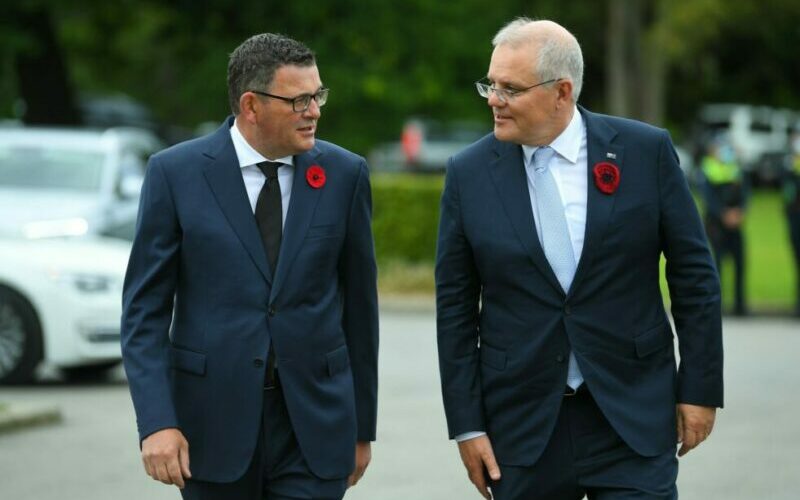
The premier could turn the tables on critics by demanding explanations about the Morrison government’s favouring of NSW and other pandemic missteps.
If I were Daniel Andrews I would be deferring, but not dropping, proposed legislation designed to draw from some of the lessons of the coronavirus pandemic. But I would not be retreating either in confusion or disarray. I would be preparing for an exhaustive independent review of how the Commonwealth and the states managed their response to COVID-19 — a review which could take in a host of circumstances intrinsic to that management, including the ”Dictator Dan” campaigns of News Corp, questions about partisan treatment of different states by the Commonwealth, and the effectiveness of National Cabinet arrangements.
There would be hardly anything such a review, with royal commission powers, would not be able to cover, provided that it affected the response to the pandemic. If he were smart, Andrews might invite other states and territories to have similar inquiries, if not ones that led to delays in issuing a report able to be read and judged by the electorate. The smartest thing of all would be to have simultaneous inquiries in all jurisdictions into local management of the virus, with a select number of the commissioners looking over national management, federal-state co-operation issues and, with or without the participation of the Commonwealth, the actions of the Commonwealth bureaucracy, ministers (including the prime minister) and the expert advice on tap.
Though there would be both a short and a long-term political purpose in having a wide-ranging independent inquiry, it should not be supposed that the primary purpose in Andrews’s mind would be a partisan one. It has been a century since Australia has had a pandemic as severe as this one, and, necessarily, politicians and agencies mostly did their best, but made plenty of mistakes, including ones of logistics, organisation of medical staff and acute care resources. Each state had significantly different strategy and tactics. Each had its fans, but it would be useful, with all of the wisdom of retrospect, to make some considered judgment about the best response, the borders for different types of lockdown, and base-rules about matters such as masks, checking in to risky locations, the runs about maximum attendance at weddings, funerals, dinner parties and so on.
I am sure that we also have lessons to learn about the ordering and rollout of vaccines, and about priority cases. Australia had remarkably few deaths compared with other countries, but better management of some areas also known to be a priority could probably have cut the number we did suffer in two. Efforts to vaccinate Aboriginal populations — agreed in advance to be mostly a Commonwealth function — were a disgrace, as was the preference shown by the prime minister in organising vaccine supplies for Sydney, at the expense of other states and territories, and rural and regional areas. The very ordering of vaccines in 2020 calls for detached, rather than heated, inquiry.
There are also continuing controversies about school closures, and now that vaccines have arrived, about what age children should be before they are vaccinated. More widely there are questions about shutdowns for particular industries, and about the efficacy of curfews and quarantine measures.
No doubt the Commonwealth would strongly resist the idea of a state inquiry into its management of the economic shutdown, and emergency measures such as JobKeeper. Yet the states could point out that they were closely involved in the organisation and management of such schemes, which played a major role in maintaining liquidity, regional economies and families put out of work through no fault of their own. The states also have an interest in seeing a proper investigation into the decision by Treasurer Josh Frydenberg to make no effort to recover payment of more than $40 billion to firms who simply did not meet the criteria for payment. What a shameful counterpoint to Robodebt — the harassment and illegal persecution of welfare beneficiaries for non-existent debts.
We still don’t know which states had the best strategies, and why they worked, or failed
Other folk might feel the need to review the effectiveness of working-from-home arrangements and whether, after the end of lockdowns, this still has a role. While many will praise different police forces for their responses, I think there is also room for a look at the bossy, authoritarian and unaccountable actions of some commissioners — including arrests for cases where a summons might have served. Mick Fuller in NSW was a particularly bad example, perhaps the more so both because he had additional functions and powers as emergency commissioner, and because he has always had a highly political way of converting his prejudices into police policies.
I would also (mischievously) like to see an inquiry into the quality of the journalism over the period, not least with some comparison of the largely uncritical run given Gladys Berejiklian in NSW, and the relentless assault on some of the other premiers, especially ”Dictator Dan”. Even ABC commentary was persistently biased — as was, increasingly, the old Fairfax media. In Canberra among many senior journalists (even non-ranters) there was a consensus that the approach of both the Queensland and West Australian premiers was quite beyond the pale. Neither I, nor I assume Andrews, would like to interfere with freedom of speech or the right to hold any opinion, however absurd, one wants. But there can be no question that the capacity of governments to manage the pandemic was adversely affected by the very hostile approach of some in the media, and that, on occasion, it was not clear what was presented as fact and what was opinion. In such a circumstance it might be useful to submit some of the commentators to the same sort of scrutiny as bureaucrats, advisers and politicians.




